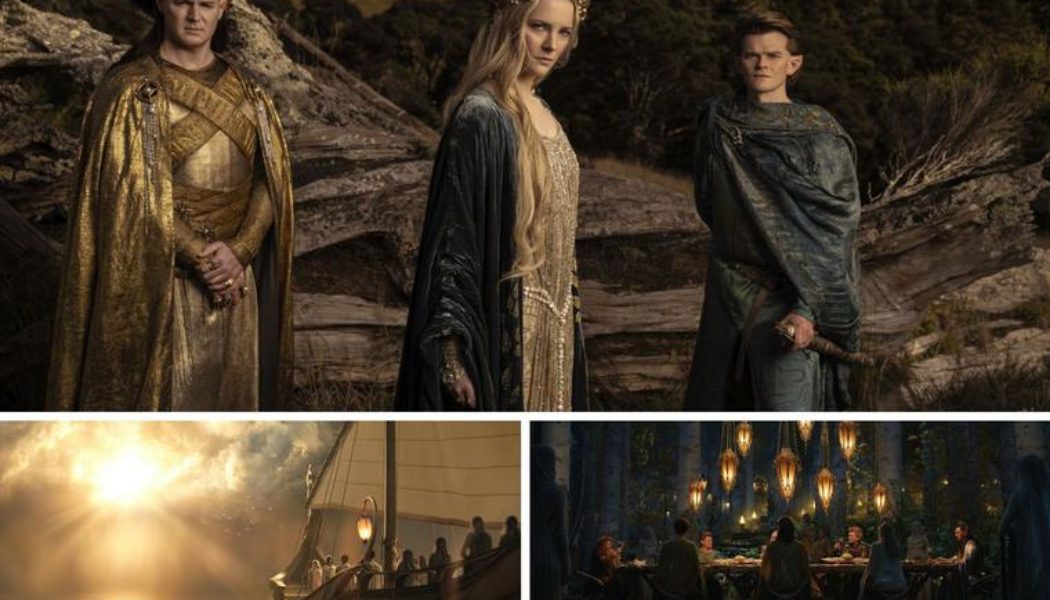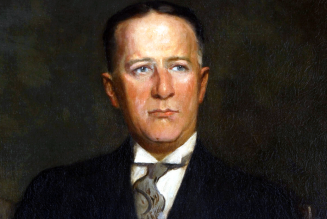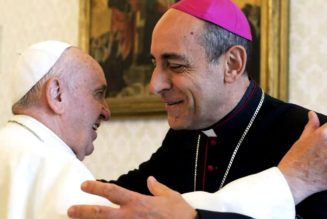
Few fan bases are more passionate about their subject matter than devotees of J.R.R. Tolkien’s The Lord of the Rings and the mythic universe within which it is contained. And few corporations are viewed with more trepidation these days than Amazon.com, Inc.
So when it was announced in 2017 that the multinational, multiplatform company had acquired the rights to create its own Middle-earth-themed television series, speculation raged over whether the new offering would be a worthy contribution to the world Tolkien created — or a corruption of it.
Now, halfway through what is planned to be the first of five seasons, we’re in position to pass at least some initial judgment on The Lord of the Rings: The Rings of Power, Amazon’s take on the Second Age of Tolkien’s legendary world. The Register spoke to four Catholic fans of Tolkien who have watched the Rings of Power series to get their perspective.
Kaitlyn Facista is the creator of the online “Tea With Tolkien” community and has also written The Silmarillion Readers Guide and To Middle-earth and Back Again.
Thomas Mirus is the director of podcasts for CatholicCulture.org, where he hosts the “Catholic Culture Podcast” and co-hosts “Criteria: The Catholic Film Podcast.”
Alexi Sargeant is a writer and theater maker, who recently co-created with his wife a Tolkien-inspired game called “Back Again From the Broken Land.”
And Stefano Rebeggiani is a professor of classics at the University of Southern California and writes on art and culture for AngelusNews.com, the news outlet for the Archdiocese of Los Angeles.
Nota bene: very mild spoilers ahead.
When the series was announced, there was concern among some Tolkien fans that his material would be inevitably distorted in the hands of Amazon, producing something like “Game of Thrones in Middle-earth,” or promoting ideological outlooks deeply at odds with the source material. In terms of fidelity to Tolkien, what letter grade would you give The Rings of Power so far?
FACISTA: B+. As I’ve explained on the “Tea With Tolkien” blog, I believe it’s best to approach The Rings of Power as something separate from but rooted in the world of Tolkien; in my opinion, this series is not a direct adaptation of any one of Tolkien’s stories, but a new version of Tolkien’s myth. When approaching it in this light, I’ve really enjoyed what we’ve seen of the series.
In terms of the overall themes we’ve seen presented thus far, I believe the series is remaining fairly well-aligned with Tolkien’s overall emphasis on hope, mortality, magic as machine, the power of light and beauty, and the role of Providence at work in Middle-earth. While some elements of the legendarium have been either changed, omitted or shifted around — and this is frustrating — I do feel the overall essence of the series is very Tolkienian. I have not seen any indication that The Rings of Power will be embracing the nihilistic tone or presenting the kind of graphic violence and sexuality Game of Thrones has become known for. In fact, I remain hopeful that I will be able to continue watching this series with my whole family.
MIRUS: D. The show repeatedly reduces motives to the passionate or the political. In Tolkien’s backstory, Galadriel is indeed flawed, but in a much more interesting way. She leaves Valinor because she wants a realm of her own to tend, so that her redemptive moment in The Lord of the Rings is when she chooses to refuse her one way of preserving that realm and her rule over it. The show replaces this with a standard revenge motive. In Tolkien, the Elves who left Valinor are banned from returning for long ages, and their return has great spiritual significance, whereas in the show, the Elves in Middle-earth apparently have the authority to send their people back at will — and they do so as a political move to get Galadriel out of their hair. In Tolkien, the Númenóreans are a high race who fall through desiring the Elves’ immorality; in the show, we get dime-store racism and ignorance, with a risibly on-the-nose MAGA rally: “Elf workers taking your trades!” is an actual line. Didn’t South Park do that bit already? Lazy, reductive, embarrassing.
SARGEANT: I would give it an A-, but I am grading on a curve. We have to consider The Rings of Power a fan work, albeit one that has a massive budget and the sign-off of the rights-holders. But it is not a straightforward adaptation like The Lord of the Rings or Hobbit movies, where we can easily count deviations from the specific source material and then decide which ones are forgivable. The creators of the show are working from scattered and contradictory notes of Tolkien’s, and so are essentially weaving their own story of the Second Age. Are they faithful to the spirit of Tolkien? I argued they were in this piece for First Things, highlighting in particular the show’s interest in sub-creation.
REBEGGIANI: Before I answer this question: I do not think philological accuracy should be our primary criterion in assessing this show, especially since Tolkien did not leave us a detailed account of the events of the Second Age, which are the subject of the Amazon series.
Contrasting Amazon’s The Rings of Power with Tolkien’s is, however, helpful, for it gives us a very high artistic standard against which to measure what we are watching. Compared to the quality of Tolkien’s work, this show disappoints. I would give it a B-. This is a not very good, not sufficiently engaging show. As for the ideological outlooks, nothing I have seen in the first three episodes struck me as dramatically at odds with Tolkien’s worldview. Rather, the show is more simplistic, much more superficial, and eventually much less engaging than Tolkien’s works.
Some have been critical that The Rings of Power depicts characters of certain mythic races or peoples in a way that departs from Tolkien’s description. I.e., The queen-regent of Númenor, Míriel, is played by an actress with dark skin, while she is described in source material as “fairer than silver or ivory or pearls.” Others have argued that the demographics of actors in Tolkien-inspired films “can and should change in retellings” as the stories reach a more diverse audience. What’s your perspective on this dispute?
FACISTA: It seems to me that there is a fundamental misunderstanding of Tolkien’s own words at the root of this criticism. Tolkien most frequently uses the word “fair” to describe something as being beautiful or favorable: The silmarils are the fairest of all gems; trees may grow fair and tall; Sauron himself is able to appear fair and wise for a time; Frodo remarks that a servant of the enemy would “seem fairer and feel fouler,” etc. Oftentimes, Tolkien will pair a description of something as fair with also being noble, fruitful or wise. In the case of Míriel specifically, Tolkien’s description as “fairer than silver or ivory or pearls” seems consistent with this usage of the word. While a modern reading may attempt to equate “fairness” with lightness of skin in every instance, this seems to me an inappropriate interpretation of Tolkien’s works.
My understanding of Arda as an entire world is that peoples of all skin tones and ethnicities would be present, just as they are in our own world, so it should follow that they are also present in visual representations of Tolkien’s works.
MIRUS: While I think the push for “representation” in stories is often misguided, I don’t in principle object to changing the skin color of a character or even a whole people — or better, making creative use of the non-white peoples Tolkien already included but did not flesh out (Easterlings, Haradrim). The artistic problem arises when diversity is sprinkled around heedless of world-building integrity. One of Tolkien’s most praised achievements is the internal consistency of his world, and lineage is a big part of his stories. Make it make sense — where did these people come from? Introduce a whole nation of black dwarves if you wish, but treating every village and culture as though it would be as cosmopolitan as Manhattan is absurd.
Then there’s a meta-aspect, observed by my co-host on “Criteria: The Catholic Film Podcast”: This is not just colorblind casting, as the diversity is clearly deliberate; and yet it’s done haphazardly, such that it requires suspension of disbelief. So we’re being told to believe that race is important and that it’s unimportant simultaneously. Within the show itself, that’s a piece of incoherence; but in the political discourse around the show, it takes on the character of a disingenuous head game.
SARGEANT: This is a non-issue. If you are directing Othello, you ought to think carefully about how you cast actors of different races. But if you are directing King Lear or another play that is not about race, you are free to cast the best actors who audition. The Rings of Power is not telling a story about race (at least not real-world race; there remain tensions among elves, dwarves and men in the show’s depiction of Middle-earth). It is perfectly reasonable for the showrunners to assemble a diverse cast. And Black actors (like Sophia Nomvete, who plays Princess Disa) are delivering some of the best performances on the show.
REBEGGIANI: I think the vision of a multiracial Middle-earth is deeply consistent with Tolkien’s outlook and entirely acceptable, even if specific choices do not match Tolkien’s characterization (e.g., Míriel), or appear at times slightly confusing (i.e., members of the same family having different races).
What is, however, at odds with Tolkien’s theory of artistic creation is the idea that artistic choices may be dictated by a moral or ethical agenda (e.g., “characters must be racially diverse to promote diversity and representation”). Unlike what many people think, Tolkien did not set out to write a story imbued with Christian values. He would have shuddered at the idea that the primary goal of a work of art is to educate people. His aim was to make something beautiful, and he believed that true beauty is never divorced from truth. In other words, in Tolkien’s theory of creation the aesthetic is primary, the ethical secondary. No matter how valid the moral goal is, having a preordained agenda dictate artistic choices is, in Tolkien’s view, unlikely to produce great artistic results. That is just not how great works of art are created.
Tolkien’s world is characterized by an unapologetic portrayal of the struggle of good versus evil and the triumph of apparent weakness in the face of power. Is his moral vision coming through in the show? Is there a character or a scene that you can point to that either exemplifies or departs from that Tolkien-esque morality?
FACISTA: The theme of the small and humble triumphing against great power is more present in the Third Age (as seen in The Hobbit and The Lord of the Rings), but I do feel that it remains a consistent theme throughout the history of Middle-earth. While we are still very early in the storyline, I feel the inclusion of the Harfoots may be seeking to exemplify this sense of “small hands moving the wheels of the world” as they begin to build a relationship with the mysterious and yet seemingly important character known as “The Stranger.” In terms of unapologetically fighting for the good against evil, this seems to be a major aspect of the series’ version of Galadriel, as well as the created character of Bronwyn. I wouldn’t say that the series is departing from this moral vision, but it is also exploring the darker aspects of Middle-earth’s history in a very interesting way, as we will see characters having to make the difficult choice between good or evil — and we know not all will choose the good.
MIRUS: This question is harder to answer so early in the show’s run. So far, the show doesn’t seem to be subverting the very notions of good and evil, but it is quite shallow in incarnating them. For example, Galadriel is indeed a flawed character at this stage in Tolkien’s legendarium, but The Rings of Power writers don’t seem to know how to portray a character who is high, graceful and even virtuous, despite also being proud and self-willed, in an appealing way. The show’s Galadriel is downright stupid and graceless: Witness her behave like a bull in a china shop the moment she sets foot in Númenor. (Peter Jackson, who rarely met a character he didn’t take down a notch, made the same error in reducing Denethor to a madman — but even that lesser Denethor was far more interesting to watch than this Galadriel.)
There’s also a lack of trust in virtue being interesting of itself — the writers think arbitrary conflict is necessary for character dynamics and drama, as in the introduction of Prince Durin, who throws a tantrum over Elrond not visiting him for 20 years. The effect is instead tedious and makes me instantly lose respect for the character making the fuss. From the start, their reconciliation is never in doubt, so why even bother? And while such conflict over hurt feelings might be appropriate in a Pixar movie (nothing against Pixar), it is far beneath Tolkien’s subject matter and his respect for his characters.
When it isn’t introducing arbitrary character conflict, the show (literally and figuratively) treads water with pointless, clichéd action. Take the moment when Halbrand and Galadriel are at sea — no, not the pointless sea monster sequence, I mean the pointless scene just after that when Halbrand saves Galadriel from drowning, complete with “ethereal,” shimmering, slow-motion underwater photography and melodramatic music. Who could fail to be indifferent to these perfunctory, prefabricated signifiers of emotion?
REBEGGIANI: As I discussed in my Angelus piece, from what I have seen so far, the show tends to oversimplify and water down rather than outright contradict Tolkien’s moral vision. In this respect, the inability to live up to the philosophical depth of Tolkien’s works matters terribly. It matters because we, as human beings, are complex, and so we identify with complex characters. I do not wake up in the morning feeling an urge to fight evil or avenge a loved one: Thus the character of Galadriel, as she is portrayed in the show, leaves me very cold.
In Tolkien’s original design, Galadriel is a deeply complex character who needs to fight evil in herself, too (which is how I feel about myself most of the time). She is anguished by the passing of time and is tempted to use power to preserve the beauty of Middle-earth for her and her loved ones. I am afraid of death, too, and I am deeply oppressed and saddened by the passing of time and would love to exempt myself and my loved ones from this ordeal. If Amazon’s Galadriel had been true to her Tolkienian self, I would have identified with her plea. But Amazon’s Galadriel felt too much like a two-dimensional cartoon, a fairy-tale character with very little to say to modern audiences.
Of course, Tolkien’s original work was less of a philosophical treatise and more of a mythic story. In terms of good storytelling, how is Rings of Power so far? Which storyline are you most interested in continuing to follow? Least interested?
FACISTA: Something which sets The Rings of Power apart from other recent series is the existence of so many different storylines set within so many realms. With over 20 main characters, it feels like there’s really something for everyone, and I love hearing that my least favorite storylines may be someone else’s favorite. I think this speaks to the vastness of Tolkien’s works, which allows readers to connect with his world in so many different ways.
In particular, I’ve been most drawn into the story of the Southlands, as its lands and peoples are currently in the midst of a terrible reshaping. I’ve also been incredibly impressed by Ismael Cruz Córdova’s portrayal of the Silvan elf Arondir within this storyline and intrigued by the role that the mysterious Adar will play as the series progresses. My least favorite storylines have been about the Harfoots and the dwarves, as they haven’t captivated me personally. I’ve also found it hard to follow Galadriel’s storyline, as it’s so different from Tolkien’s original depiction of her character.
MIRUS: I can’t say I’m interested in following any of the storylines — partly because so far the show has been mostly buildup. There are a few characters I enjoy watching, not for the writing but for the performances: Elrond, Disa and Elendil. But of those, Elrond is the only one I would positively want to see more of.
Unfortunately, Galadriel, the character we know most about from Tolkien, and thus the one we hope to be the most interesting, is a train wreck. I mentioned the writing already, but the actress does nothing to elevate what she has been given, speaking everything through grit teeth and giving a really flat, tense and, again, graceless performance. Contrast this with Robert Aramayo, who has relaxed into his role as Elrond, and so brings out a supple, nuanced, multicolor performance, one which is, while more youthful, fully compatible with the older Elrond we know in The Lord of the Rings.
I will admit I was moved by a moment involving the White Tree at the end of Episode 4. But that was partially just because something finally happened!
SARGEANT: The Númenor storyline is the one I find most interesting right now. The show created a beautiful vision of the island kingdom. We all know this will end in an Atlantis-like tale of hubris and destruction. But it is intriguing to see how the show will depict the steps along the way. I am also interested in the story of the Harfoots and the Stranger, though I am ready for that to pick up its pace. On the other hand, I would be happy if the show put more of its cards on the table regarding Sauron. We don’t need to keep playing guessing games about who is or isn’t Sauron in disguise!
REBEGGIANI: The storytelling is, I think, decent, and by that I mean it is professionally done, by people who know what they are doing. I feared the dialogue would be artificial and stilted, stuffed with background information not at all connected to the situations the characters are in, but that is almost never the case. The storyline that most interests me is the one about Elrond, the dwarves and the forging of the Rings. I would be curious to see how the show goes about blurring the lines between the good and the bad, since the forging of the Rings sees the “good” elves deceived by Sauron into creating instruments of dominion.
Halfway through the first season, would you say your interest has grown or diminished since the series began? And if a Catholic friend asked you if they should check it out, what would you tell them?
FACISTA: I would absolutely say that my interest has grown as the series has progressed. While it was disorienting at first to wrap my mind around all of the changes made within the storyline, and I certainly have my own specific criticism which I’ve been sharing weekly on “The Secrets of Middle-earth Podcast,” I really have been looking forward to each episode’s release. I’ve also found a wonderful sense of community among other Tolkien fans who are enjoying watching, dissecting and discussing the series online. If you’re looking for a new series to watch, The Rings of Power is certainly worth giving a try. It may not be everyone’s cup of tea, but I’m personally enjoying it quite a lot. Thus far, I have not seen anything within the series that would make it inappropriate for a Catholic to watch. I would note that if someone has young children, they should prescreen each episode before watching as a family because there have been a few frightening or violent scenes in the first few episodes.
MIRUS: After the first two episodes, I was quite bored, but not offended. But the show becomes more aggressively stupid in the third and fourth, with the lowest point being the Númenórean MAGA rally.
I would challenge Catholics to resist the temptation to watch something just because it is branded as Tolkien. We often watch things we ourselves admit to be mediocre, simply because we have been inculcated with the impulse to consume — but we owe ourselves better. I’m not a stranger to the vague, perverse sense of obligation to follow along when it comes to a beloved … sigh … “franchise.” But how long will we happily eat whatever corporations serve us, just because we have time to kill? That’s a Morgul-spell that can and should be broken.
SARGEANT: My interest has grown. By my estimation, the most recent episode was the best one so far. I think the show might, ultimately, prove a worthy piece of Tolkien-inspired storytelling. Interested Catholics should absolutely check out the show and see what they make of it.
REBEGGIANI: My interest was already over after Episode 2. But I would still tell my Catholic friends to check it out, and to do so without preassumptions. I would tell them to not measure the show primarily on its adherence to Tolkien or even on its ideological makeup. My advice would be to approach it as they would any work of art: Is it entertaining? Is it beautiful? Does it make you want to watch the next episode? This is how Tolkien would have approached it: without prejudice, and basing his judgment primarily on aesthetic grounds; for in his view, when a work of art is well-made from a formal point of view, when it has been crafted out of a desire to create beauty that is entirely free from ideological agendas or educational goals, when it succeeds in pleasing, entertaining and enchanting viewers, then it cannot fail to also express some kind of truth. A work that is full of half-baked, cartoonish characters, one that fails to represent human beings in their bewildering complexity, fails on aesthetic grounds even before its intellectual limits begin to appear.
Join Our Telegram Group : Salvation & Prosperity








